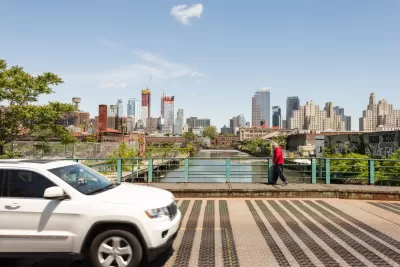A controversial zoning—one of the last of a de Blasio administration that has rezoned parts of every borough in the city—last week cleared a key City Council committee.

"Mayor Bill de Blasio’s controversial plan to rezone Gowanus is poised to move forward, fulfilling a decade-old ambition that aims to increase development and affordability in the fast-changing industrial enclave," reports Jake Offenhartz.
The City Council Land Use Committee voted to approve the rezoning on November 10, paving the way for up to 8,000 new apartments units, with one-third of those units reserved for low-income tenants, in the relatively wealthy corner of New York City.
The city's planning commission approved the Gowanus Neighborhood Planning Study in September, paving the way for last week's City Council’s Land Use Committee vote. The Gowanus rezoning plan previously encountered Covid-related delays and repeated bouts of controversy.
Offenhartz describe the rezoning as the largest upzoning of the de Blasio era—and there are plenty of other examples to compare, though the recent rezoning processes in Gowanus, along with the Envision NoHo/SoHo rezoning in Manhattan, are the first to focus on more affluent corners of the city (more on the same subject is found here and here). Earlier in its tenure, the de Blasio administration undertook rezonings in East New York, Downtown Far Rockaway, East Harlem, Jerome Avenue, Inwood, the Bay Street Corridor on Staten Island, Bushwick, and a swath of Southern Boulevard in the Bronx.
In 2014, the de Blasio administration announced the Housing New York plan to spend $41 billion to create or preserve 200,000 affordable housing units in the city, which included a Mandatory Inclusionary Housing program that influenced all of these rezoning programs.
FULL STORY: Agreement On Gowanus Rezoning Will Bring 8,000 New Apartments, Public Housing Investment

Maui's Vacation Rental Debate Turns Ugly
Verbal attacks, misinformation campaigns and fistfights plague a high-stakes debate to convert thousands of vacation rentals into long-term housing.

Planetizen Federal Action Tracker
A weekly monitor of how Trump’s orders and actions are impacting planners and planning in America.

San Francisco Suspends Traffic Calming Amidst Record Deaths
Citing “a challenging fiscal landscape,” the city will cease the program on the heels of 42 traffic deaths, including 24 pedestrians.

Adaptive Reuse Will Create Housing in a Suburban Texas Strip Mall
A developer is reimagining a strip mall property as a mixed-use complex with housing and retail.

Study: Anti-Homelessness Laws Don’t Work
Research shows that punitive measures that criminalized unhoused people don’t help reduce homelessness.

In U.S., Urban Gondolas Face Uphill Battle
Cities in Latin America and Europe have embraced aerial transitways — AKA gondolas — as sustainable, convenient urban transport, especially in tricky geographies. American cities have yet to catch up.
Urban Design for Planners 1: Software Tools
This six-course series explores essential urban design concepts using open source software and equips planners with the tools they need to participate fully in the urban design process.
Planning for Universal Design
Learn the tools for implementing Universal Design in planning regulations.
Heyer Gruel & Associates PA
JM Goldson LLC
Custer County Colorado
City of Camden Redevelopment Agency
City of Astoria
Transportation Research & Education Center (TREC) at Portland State University
Jefferson Parish Government
Camden Redevelopment Agency
City of Claremont



























